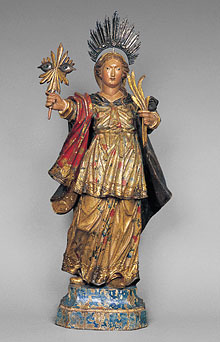
O Aleijadinho (Antônio Francisco Lisboa), Saint Lucy, 18th century. Polychromed wood, 52 x 25 x 17 cm. Collection of Renato Whitaker, São Paulo. Photo by Denise Andrade.

Antônio Francisco Lisboa, known as O Aleijadinho (The Little Cripple), is the most famous artist of the Brazilian Baroque. He was born in 1738 in the town of Bom Sucesso in Minas Gerais to a Portuguese architect and an Afro-Brazilian slave. Minas Gerais was the richest area of the country in the eighteenth century, due to the gold, diamonds, and other precious stones discovered there. Towns in the region, both large and small, constructed impressive churches, monasteries, convents, and other ecclesiastical buildings and a number of them were either designed or decorated by O Aleijadinho, an architect as well as a sculptor. His highly expressive, even idiosyncratic style of sculpture became a hallmark of the Rococo phase of the Brazilian Baroque.
During the 1770s, O Aleijadinho began to suffer from a debilitating disease, perhaps leprosy or syphilis. The condition crippled his hands to the extent that his sculpting tools had to be strapped to his forearms by his assistants in order for him to work. Nonetheless, he continued to produce extraordinary examples of religious art. His masterpiece is located at the pilgrimage site of Bom Jesus de Matozinhos in the town of Congonhas do Campo, seventy kilometers from Ouro Prêto, where he executed between 1796 and 1799 (in collaboration with a number of assistants) life-size, cedar-wood scenes of the Passion and Death of Christ for the chapels that line the road to the main church. These impressive works are among the most significant sculptures of the Western Baroque-Rococo tradition. O Aleijadinho died in 1814.
—Edward J. Sullivan